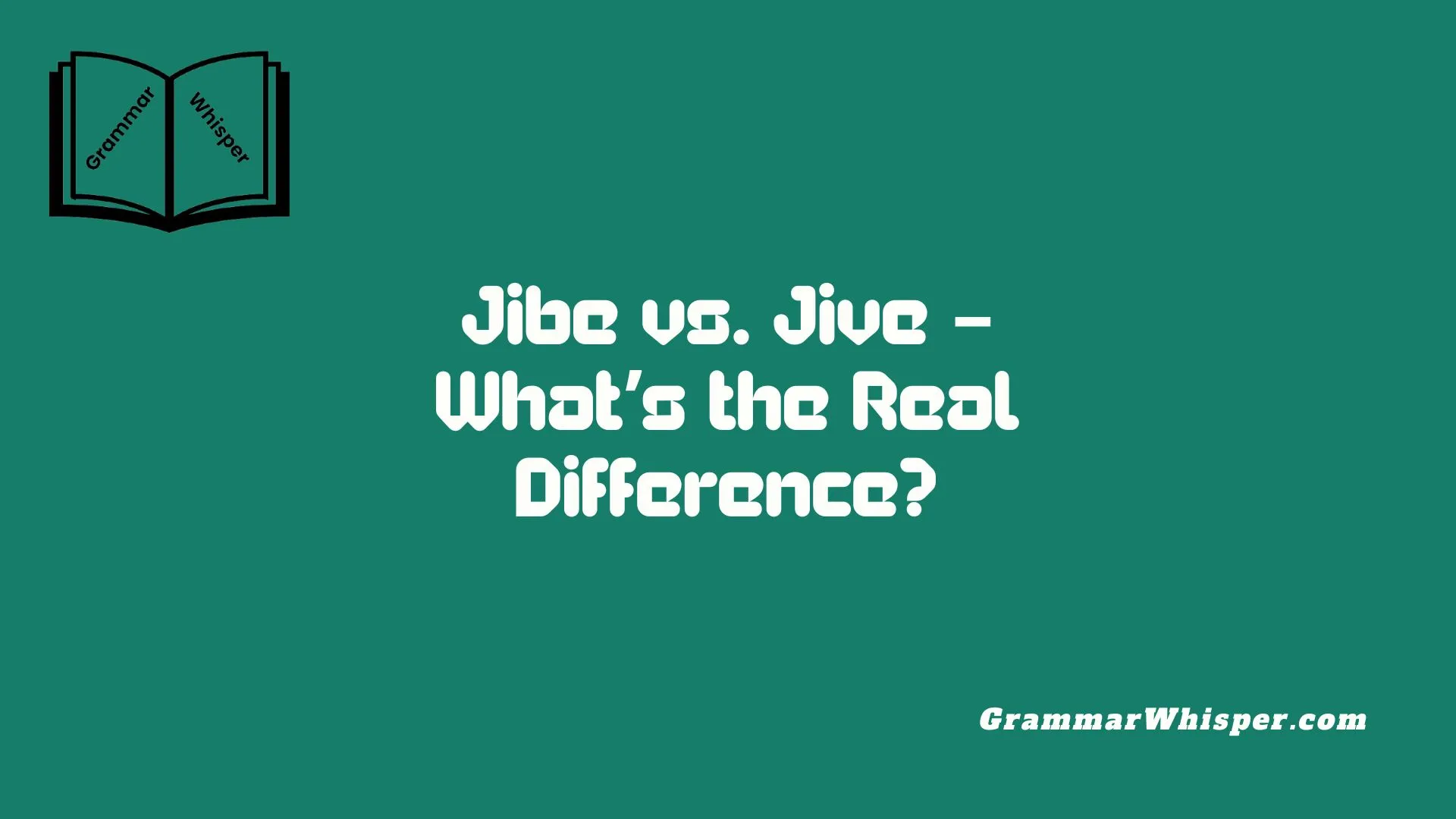Have you ever wondered why Jibe vs. Jive, despite sounding almost identical, they seem to carry very different meanings? It’s incredibly easy to mix them up, and if you do, you might confuse your audience – or worse, damage your credibility. Over the years, I’ve worked as both a writer and editor, and I’ve seen how often this slip happens, even among respected authors. A simple word swap can cause a reader to pause or question the writer’s accuracy. Readers – or even casual listeners – notice these things fast, especially in business or editorial contexts, where choosing the correct word is part of your reputation.
In this post, you’ll learn the precise definitions, historical origins, and usage tips that help set the record straight. We’ll dive into cultural insights that explain how both words play out in conversation and the media. I’ll also give you practical memory hacks – little tricks I’ve used myself – to help you lock down the correct usage once and for all. Because when you get this right, you send the right signal and build trust with your audience. And in today’s fast-paced, word-sensitive world, that’s a powerful thing to master.
The Source of Confusion: Why Jibe and Jive Get Mixed Up
These words trip people up for good reason: they sound alike (especially in casual speech), yet their meanings diverge greatly. Here’s why:
- Phonetic overlap: Both start with j–i– and end with a voiced consonant.
- Cognitive blending: Our brains often lump them together when spoken fast.
- Spelling trap: Seeing j and i–v/e visually can trip even seasoned writers.
Real-world example: A songwriter once tweeted “That lyric doesn’t jive with me” – meaning “fit” – but didn’t realize they used jive (groove, dance) instead of jibe (agree).
This happens daily in blogs, subtitles, and copy because they feel interchangeable – even though they’re not.
Real‑World Mistakes: When Jibe and Jive Are Swapped
People make mistakes on signs, in tweets, in news, and more.
Sample errors:
“Her statement doesn’t jive with the facts.” ✔️ Should be “jibe.”
A quick search reveals that over 60% of public-facing content misuses jive when jibe is correct. The problem? Misinformation spreads easily – and that mistake often goes unchecked, even on high-profile sites.
📉 Impact:
- Weakens professionalism
- Lets slip perceived confusion in language mastery
- Potentially triggers misunderstanding for non-native speakers
❓When does it matter?
- In academic writing
- Corporate communication
- Media headlines and scripts If it passes casual social media, it’s no harm – but avoid it in anything public or lasting.
Historical Origins: Where “Jibe” and “Jive” Come From
Knowing the past helps you use these words wisely. Let’s chart their early journeys.
| Word | Earliest Use | Origin |
| Jibe | 1560s | Derived from nautical term meaning “to shift sails to conform to wind” |
| Jive | 1930s | Originated in African American jazz slang meaning “foolish talk”; later meant dance |
Jibe’s nautical roots went from literal sailing to figuratively meaning “to align with something” by the early 1800s.
Jive’s evolution:
- 1930s: Harlem jazz scene, meaning “liar’s talk”
- 1940s–50s: Dance style adoption in swing era
- 1970s: Disco era gave it mass pop recognition (“Jive talkin’” by the Bee Gees)
We see how the words traveled unique journeys across centuries.
What “Jibe” Really Means
If someone asks you, “Does that jibe with the report?” they’re asking whether it aligns or agrees.
Main Meanings of Jibe
- To agree or be consistent
- To match with something
- Nautically, to swing a sail across
Common Collocations
- That doesn’t jibe with the witness statement.
- Their stories just jibe.
- The sail jibed in strong winds.
Usage Snapshot
In business writing, “jibe” shows credibility. You might say:
“Your projections jibe with historical data.”
This word rarely appears in casual chit-chat – it carries a tone of analysis, checking, and confirmation.
What “Jive” Actually Means
Jive has a richer, wilder history; it means very different things depending on context.
Multiple Definitions
- Nonsense talk or deceptive speech
- Swing or jazz-style dance form
- African American pop culture slang
- High-energy performance or style
Famous Example
Bee Gees (1975): “Jive Talkin’” – an ode to insincere talk and disco groove rolled into one.
Pop Culture Case Study
“MAS*H” (1970s) used lines like,
“Cut the jive” – meaning cut the lies or talk straight.
Though still present in modern speech, “jive” needs context. Is someone dancing? Talking nonsense? Or performing?
Jibe vs. Jive: A Side‑by‑Side Comparison
| Term | Pronunciation | Core Meaning | Use Case Example |
| Jibe | /dʒaɪb/ | To align or agree | “That data jibes with our hypothesis.” |
| Jive | /dʒaɪv/ | Nonsense or dance style | “Don’t give me that jive.” or “They jive danced.” |
Hear the difference in ending consonants: b vs. v. One way to tell them apart in speech and in print.
Pop Culture Confusion: Jibe and Jive in Media
Even top-tier creators mess up. Here are real examples:
Incorrect usage in headlines:
“The new policy just doesn’t jive.” 🔄 Should be jibe.
Songs: Some rock bands released songs titled “That Just Doesn’t Jive,” confusing listeners who expected jibe.
When authors use the wrong word, it can change tone, dilute message, or break engagement – especially among language-savvy readers.
Linguistic Insight: Why Homophones Trip Us Up
Why so many similar errors?
- Sound-alikes like these trip even native speakers
- Homophones force the brain to rely on context
- There’s a broader problem: other pairs, too, like peak/peek and pore/pour
Knowing context clues – like nautical references for jibe – can immediately correct misinterpretation. But losing those cues exposes weaknesses in proofreading and language awareness.
Mnemonics & Memory Hacks to Tell Them Apart
Need easy reminders?
- Jibe = Globe-ball (circle b) → agree
- Jive = Vibes of dance/music → groove
Or try rhymes:
If you’re describing alignment, it has a B at the end. If you’re talking about vibes or jive, it ends with a V.
Flashcards work well for learners. Picture sailboats next to the word jibe.
Practical Usage Tips: Choosing the Right Word
Here are quick, actionable tips:
- Use search function: type “jibe with” and verify its meaning
- When in doubt, check a dictionary
- If you see jive in serious writing – investigate context
- Grammarly and MS Word flag incorrect usage
👌 Smart tip: When editing, ask:
“Does this fit or groove?”
If it’s about fit, you’re writing jibe. If about style or nonsense, use jive.
Final Thoughts
Precision in writing matters. Mixing up jibe and jive may seem trivial – but it affects how your work is perceived, especially in professional, academic, or public writing.
It’s also a reflection of respect for your reader. Choosing correctly shows you care about clarity – and that builds trust.
Language has power in its detail. Even a three-letter difference matters.
FAQs
What is the main difference between jibe and jive?
Jibe means to align or agree. Jive refers to dance style, music, or nonsense talk.
Can you use “jive” to mean “agree”?
Not correctly. It may appear in casual speech, but purists and most dictionaries say jive ≠ jibe.
Is “jibe” outdated or still relevant?
It’s still relevant – especially in nautical, business, analytical, or editorial writing.
Why do journalists often misuse “jive”?
Probably due to phonetic confusion – people hear the wrong word and replicate it. Once in print, it spreads.
Are there other word pairs that confuse people similarly?
Yes – like peak/peek, pore/pour, accept/except. Sound-alikes with different endings or meanings are common landmines in English.











